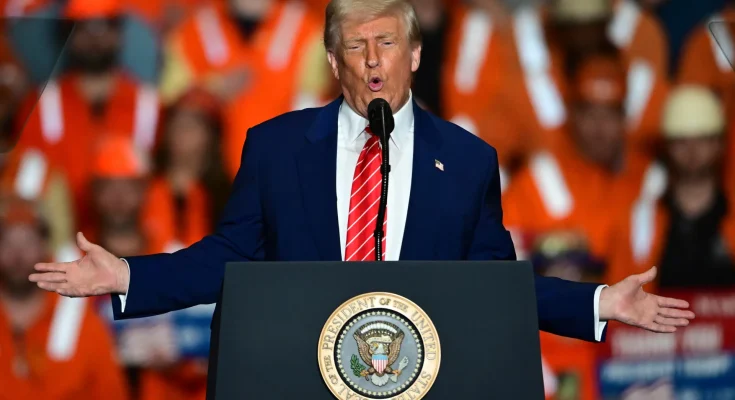On Friday, President Donald Trump declared that he will increase tariffs on all steel imports to 50%, effectively doubling them and intensifying the trade conflict he began in March to safeguard the U.S. steel sector.
This announcement by Trump follows a recent agreement between U.S. Steel and Nippon Steel, a Japanese firm, which is intended to support the American steel producer.
“We are going to implement a 25% hike. We will raise it from 25% to 50%, the tariffs on steel in the United States of America, which will further bolster the steel industry in the United States; no one will circumvent that,” Trump stated at a U.S. Steel facility in West Mifflin, Pennsylvania.
Trump indicated that he had originally contemplated a 40% tariff but eventually decided to increase it to 50%, without providing details on the reasoning behind that choice, as reported by the Washington Times.
The declaration was made during a speech commemorating the collaboration between Japan’s Nippon and U.S. Steel, in which the Japanese firm will purchase nearly all shares of its American counterpart in a transaction valued at around $13 billion, according to the outlet.
In March, Trump revealed a 25% tariff on all imported steel and aluminum to bolster domestic manufacturers, building upon steel tariffs he had first enacted during his initial term. Those previous tariffs continued to be enforced under former President Joe Biden.
Since the implementation of the tariffs, the fabricated metals sector has experienced an increase of 3,400 jobs, while primary metal manufacturing has added 2,600 positions, as reported by the Department of Labor.
Additionally, raw steel production has witnessed a 6% rise since Trump assumed office, and capacity utilization within the steel industry—a crucial indicator of operational efficiency—has improved by 3.7 percentage points, according to the Times.
This growth in employment and steel production has led American steel executives and union representatives to urge Trump to raise tariffs.
The protection of the U.S. steel industry has been a fundamental aspect of Trump’s campaign, focused on safeguarding blue-collar jobs in vital Rust Belt states such as Pennsylvania, Michigan, Indiana, and Ohio—all of which he won in the 2024 election.
Nevertheless, organizations like the U.S. Chamber of Commerce have opposed the tariffs, cautioning that increased costs for steel and aluminum will negatively impact American manufacturers. They contend that these higher expenses will likely be transferred to consumers and could diminish the competitiveness of U.S. industries on a global scale.
“Price increases for industrial materials such as steel and aluminum negatively impact a wide range of downstream manufacturers throughout the United States, including those in the automotive and aerospace industries, as well as food producers and the oil and gas sector,” stated John G. Murphy, a senior vice president at the chamber, in a recent blog post, according to the Times. “For every job in steel manufacturing, approximately 80 Americans are employed by companies that utilize steel as a raw material.”
Nippon Steel initially proposed to acquire U.S. Steel in 2023 for $14.9 billion; however, the agreement was halted due to political resistance. In January, just prior to leaving office, former President Joe Biden obstructed the deal on the basis of national security. In retaliation, the two firms initiated a lawsuit, contending that the Committee on Foreign Investment in the U.S. (CFIUS) executed an unjust review process, as reported by Fox Business.
The Trump administration reopened the review in April, and President Trump recently voiced his support for the amended agreement. In a social media post dated May 23, he remarked that the collaboration would enable Nippon Steel to invest without taking full ownership of U.S. Steel. Trump officially sanctioned the deal, labeling it “a blockbuster deal” that guarantees the company “remains an American company.”
While speaking on Friday at the Mon Valley Works Irvin Plant near Pittsburgh, Trump assured workers that “there will be no layoffs and no outsourcing whatsoever.” He also revealed his intention to double tariffs on imported steel and promised that “every U.S. steelworker will soon receive a well-deserved $5,000 bonus.”
Additionally, he commended the assembled steelworkers, stating, “You’ve gone through a lot.”

